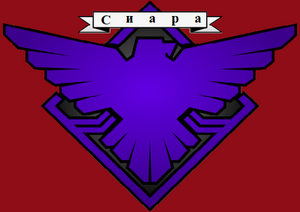Syaran Army Air Corps
| Воздушен корпус на Сијар Syaran Army Air Corps | |
|---|---|
 Insignia of the SAVK | |
| Active | 1914 - 1988 |
| Country | |
| Branch | Army of the Syaran Republic |
| Type | Air force |
| Role | Aerial warfare |
| Size | 75,445 aircraft (Siduri War production) 1,400,000 personnel |
| Supreme Air Command | Zovahr |
| Engagements | Syaran intervention in the Ruvelkan Civil War Divide War Siduri War Refusal War |
The Syaran Army Air Corps (Сијаран армиски воздух Корпус, Sijaran armiski vozduh Korpus), abbreviated as SAVK was the land based aerial warfare service component of the Army of the Syaran Republic, and the primary air force service for the Republic of Syara during it's existence. It was created in 1914, just two years prior to the outbreak of the Divide War, although it's first major actions were during the Syaran intervention in the Ruvelkan Civil War. At it's peak during the Siduri War the SAVK fielded tens of thousands of fighters and thousands of bombers, for a total production of 75,445 aircraft between 1926-1938.
The SAVK was founded in 1914 as part of the Syaran Army, it's first operations were conducting reconnaisaince flights over Ruvelka in preparation for Syaran intervention in the ongoing civil war. The Divide War immediately forced the SAVK to shift priority to contesting Cacertian control of the skies during the Desopya Campaign, including battling with Cacertian combat airships. Syara's success in the conflict combined with the Presidency of Sasko Anastasov saw the SAVK expand rapidly in the 1920s and early 1930s, producing a number of aircraft designs. The SAVK took a direct role in the Invasion of Ruvelka, and later played a major role in the rest of the Siduri War, particularly the Tennaiite Front. Despite the production of over 75,000 aircraft and the fielding of nearly 1.5 million personnel, the SAVK struggled during the conflict, suffering from competition with the rest of the Army over limited resources and a lack of organizational strategy. The SAVK lacked the ability to carry out strategic bombing campaigns against the nations of the Common Axis, and fighting a war on three fronts rapidly drained the SAVK of experienced pilots and crews. Many historians consider the SAVK to have been "broken" during 1936, after which the Air Corps entered into a permanent decline where it could not match the increasing size and skill of the Common Axis air forces, despite on paper fielding tens of thousands of aircraSft.
The SAVK gradually became more independent in the aftermath of the Siduri War, effectively becoming it's own branch by the 1950s and beyond, although it was still considered to fall under the Army. The SAVK, like the Navy of the Syaran Republic, was largely a shadow of it's former self by the time of the Refusal War, after which it was dissolved and replaced with the Commonality Air Force.